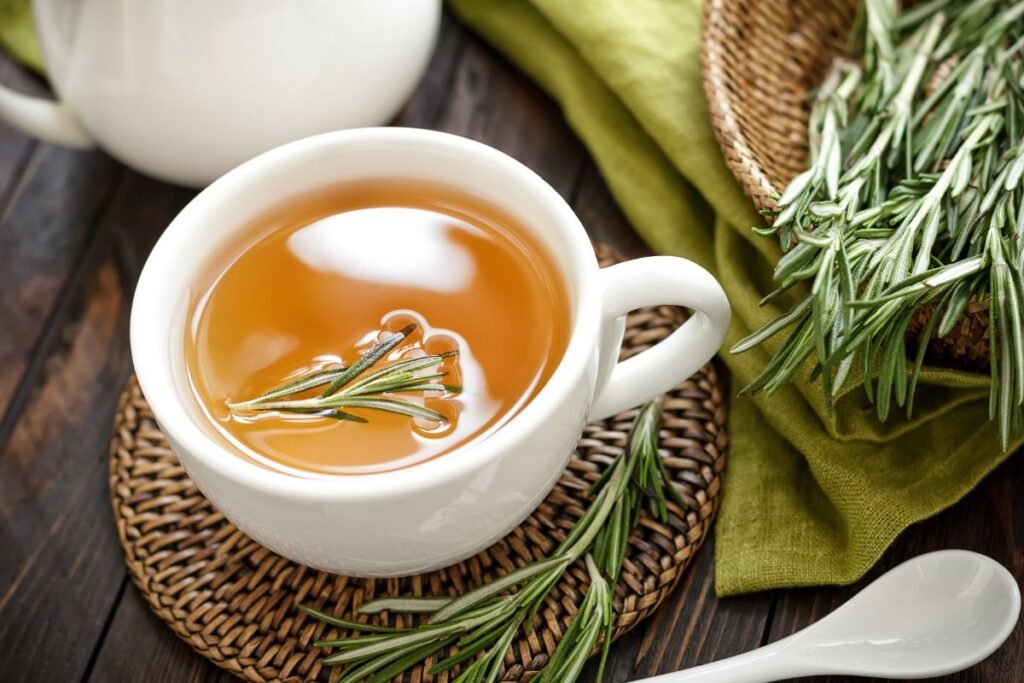Rosemary is probably familiar to everyone. We know it is a warm-weather herb most closely associated with Mediterranean cuisine and used in cooking. But have you ever thought you can use rosemary sprigs to make a cup of fragrant tea? Rosemary tea benefits our bodies.
The Healing Properties of Rosemary
Rosemary has strong antioxidant properties. This is due to the chemical compounds present in this plant—flavonoids, terpenes, phenolic acid, etc.—which are profound antioxidants. This is why rosemary positively effects the whole body, boosting immunity, fighting free radicals, and having anti-inflammatory and antimicrobial properties.
In addition to rosemary tea benefits for overall health, the herb can also be an effective treatment for specific ailments. Rosemary is an excellent source to produce rosemary oil and rosemary essential oil.

Rosemary Tea Benefits
Drinking rosemary tea can boost immunity, improve digestion, stimulate brain function, control symptoms of stress and anxiety, and reduce headaches. This tea treats particular conditions and diseases.
- Studies have shown that compounds in rosemary tea can lower blood sugar levels and increase glucose absorption. This is important for people with diabetes who monitor their blood sugar levels.
- Rosemary beverage acts as a natural diuretic. It can help flush toxins from the body in cases of fluid retention in the body.
- Rosemary tea can improve liver function and reduce headaches caused by excessive consumption of fatty foods.
- You should drink this tea after surgery. Rosemary has an anti-platelet effect and can improve blood circulation and prevent the formation of clots.
- The compounds in rosemary tea may help reduce the progression and severity of diseases such as cataracts and age-related macular degeneration.
- Rosemary tea helps prevent the adverse effects of brain aging, such as Alzheimer’s disease.
- This drink can improve mood and memory.

Preparing and Dosing Rosemary Tea
You can make tea from both fresh, home-grown rosemary and dried rosemary. However, fresh rosemary has better therapeutic potential because of its higher concentration of essential oils.Remember, that fresh rosemary has a milder flavor than dried rosemary. Therefore, for the best tea effect and flavor, it is better to use fresh rosemary for tea.
Rosemary tea requires two ingredients: water and rosemary. There are four main steps in the tea-making process, where
- Boil approximately 300 ml of water.
- Place 1 teaspoon of rosemary leaves in a tea bowl. And cover them with water.
- Steep for 5–10 minutes, depending on the concentration of the tea you want.
- Strain the tea and pour it into a cup. If you prefer, you can sweeten it with honey or agave syrup.
Drink rosemary tea immediately after lunch or dinner, as it aids digestion and reduces acidity and gas.
If rosemary tea has become one of your favorites and you can’t imagine your day without it, remember to take a 1-month break after 3 months.
Rosemary Tea Loves Improvisation
Rosemary in tea enjoys the company of other flavors. You can feel free to experiment with different ingredients and create the most unexpected flavor combinations when making rosemary tea. There is little chance of spoiling this tea.
- Make rosemary tea with milk (regular or plant-based) and enjoy the creamy consistency of the drink.
- Add a cinnamon stick to your tea—satisfying when it’s a muggy day outside.
- Use a sprig of thyme along with the rosemary to enhance the tea’s healing powers.
- Add grated ginger to a cup of rosemary tea; this will warm you up and strengthen your body.
Think about what you would like to try and continue with this list.

Rosemary Tea Cocktail
Ingredients:
- 1-2 teaspoons rosemary leaves,
- 1 small piece of grated fresh ginger,
- 10 skinless and pitted grapes,
- 200 ml of water.
Preparation method:
Place the rosemary and ginger in a tea-making bowl. Pour boiling water at 95 °C, over the rosemary, cover, and leave for 10 minutes. After this time, strain the tea.
Place the grapes in an electric mixing bowl, pour the tea, and shake. The cocktail is ready!

Rosemary Tea with Fruit and Berries
This variation of rosemary tea can be prepared according to the desired taste or effect. The tea is based on rosemary, honey, and lemon. The beverage is prepared in the usual way by brewing and steeping the herbs. Rosemary tea is sweetened with honey and garnished with a lemon slice.
The fruit and berries for this tea are chosen according to preference and need. Here are some ideas:
- Pomegranates are a source of magnesium.
- Frozen or fresh berries (blueberries, raspberries, blackberries, etc.) are high in fiber and have a natural sweetness.
- Citrus fruits (sliced) (orange, grapefruit) are sources of vitamin C.
Place the selected additives with the rosemary in a tea-making vessel, brew the tea, wait 10–15 minutes, strain, and drink.

Rosemary Essential Oil: for Hair Strengthening
Rosemary essential oil is a first aid against hair loss. And the scientific studies confirmed the effects and effectiveness of this essential oil.
Rosemary essential oil helps to control hair loss in androgenic alopecia (baldness).
In a study of people with this condition, a mixture of rosemary essential oil rubbed into the scalp daily for seven months showed a significant improvement in hair condition compared to those who used jojoba and grapeseed oil.
In another study, balding men massaged a mixture of rosemary essential oil into their scalps twice a day for six months. They saw an increase in hair volume—the same as those who used a conventional hair growth promoter.
In addition, rosemary oil was less likely to cause side effects such as scalp itching. These results are compared to those of other treatments for androgenetic alopecia.

Other Uses of Rosemary Essential Oil
Rosemary essential oil is for external use only. Due to its high concentration, it requires only a few drops. Alternatively, use a diluted product or a blend of essential oils. Never drink the rosemary essential oil.
When used safely, the product can be beneficial for a wide range of life situations.
- Massage rosemary essential oil on freezing extremities, especially with Raynaud’s syndrome (where blood flow to the extremities is impaired due to capillary spasms). This will help warm them up.
- If you have a cold, anxiety, headaches, or a bad mood, use rosemary oil inhalation. You can inhale the scent of the oil or use a diffuser.
- Rosemary essential oil can also serve as a natural repellent, repelling bloodsucking insects (mites and mosquitoes).
Rosemary Tea Side Effects in Particular Scenarios
Be sure to consult your doctor before using rosemary tea in the following cases:
- If you are having medicines for high blood pressure. Rosemary can have a similar effect and cause a dangerous condition in the body by interacting with medicines.
- If you have or have had liver disease or damage to your liver. Rosemary may stimulate the release of bilirubin, which may worsen the course of the disease.
- If you are taking diuretics. Rosemary also stimulates urine excretion and may interact with medicines to cause excessive fluid loss and electrolyte imbalance.
- If you have epilepsy. Rosemary preparations (tea, essential oil, etc.) can cause seizures.
- Rosemary tea should not be taken by pregnant and breastfeeding women or children under 5 years of age.
Sources:
https://www.healthline.com/nutrition/rosemary-oil-benefits
https://www.tuasaude.com/en/benefits-of-rosemary-tea/
https://goodfoodbaddie.com/rosemary-tea-recipe/
https://www.ncbi.nlm.nih.gov/pmc/articles/PMC4227022/
Associative photos from © Canva.

